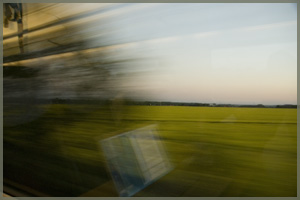
Right now I’m on the train to Dresden, thinking about language. I’m on my way to Dresden to experience what’s going on at the newly-formed World Café Europe’s first pan-European gathering, and I’m thinking about language because part of my role there will be to help convey this experience to others, and I am dreaming about ways to do that most effectively.
Processes like the World Café that offer replicable opportunities for individual and collective knowing almost always employ some form of “harvesting” as an essential part of their practice. It is often the ‘gestalt’ through which the group’s knowing is achieved – a complex and precise culmination of the deep listening and identifying of patterns that run through the gathering, and a conscious pulling together of diverse threads and perspectives into an articulate whole.
What might be possible if the harvesting was shared with the entire community of practice, or with the larger networks of people that employ these opportunities for collective knowing? If we could make this vast depth of knowledge and experience visible to everyone who was interested, might there be an accelerated collective apprehension and an experience of deep unity and connection beyond the specifics of any one group’s process?
Yesterday before I left for Germany I was having a conversation with my friend Michael Jones about different sorts of language – he’s identified three: the language of action (methods, protocols, prescriptions), the language of meaning (models, concepts, theory), and the language of story. In his system, the latter is more about conveying beauty, or an aesthetic, than it is reporting data. Using metaphor, the language of story is ambiguous, its meanings presented as a multiplicity, giving the listener’s imagination something to play with and explore from different angles. It sounds to me as if, using this definition, the language of story provides the material that can catalyze knowing in the listener. Full of question, its sentences are often more like gestures than statements; it’s the language of the senses, of experience itself.
This is the elusive language I am looking for, because important as they are for conveying useful data, I don’t think the language of action or meaning alone will engage the necessary senses in understanding what is really happening in a World Café. To access a language that takes us deep into the mystery of knowing we need details; vibrant, vivid details, alive with color and music.
I personally believe that the language of the senses – of smell and taste and touch and image – precedes story, in that these are the elements from which we create and share our stories. So what is for Michael the language of story I might call the language of the senses.
Whatever one calls it, this is the task I’ve set myself. Not only to call and ride the wave of this magical language of detail, story, and catalytic elementals, but to see if I can do so in a replicable way that would help others in their own harvesting. I have some great thinking companions in responding to this challenge, and I’m excited about this creative adventure, and the stories and catalyzations that might result.


Welcome!